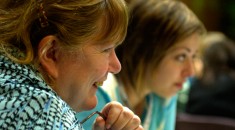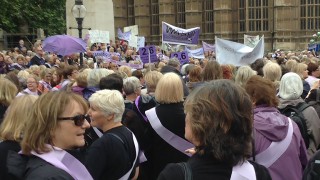A new film, Suffragette, brings to light the real story of the movement that did so much to win the vote for women in the early part of the 20th century. Starring Carey Mulligan and Meryl Streep, it’s a stirring and revelatory film, which honours the efforts of so many women who united across the class divide to change their lives.
Talking today to Helen Pankhurst, great-granddaughter of the formidable suffragette leader Emmeline, and herself a lifelong campaigner for women’s rights, it’s clear that the torch has been handed down through the generations, burning just as strongly now as it did then.
Helen’s grandmother Sylvia was Emmeline’s daughter, who joined her mother’s pro-suffrage group the Women’s Social and Political Union (WSPU). But Sylvia was also a deeply committed socialist, following in the footsteps of her father, Richard Pankhurst, a founding member of the Independent Labour Party.
Emmeline herself came to live with Helen’s parents in the last years of her life. As an elderly lady, she still suffered physically as a legacy of her activism. Her digestion was very poor as a result of being force fed in prison – a cruelty which is graphically re-enacted in the film.
Helen grew up in Ethiopia, and works there still with CARE International, campaigning on women’s empowerment. Every year she is involved with Walk In Her Shoes, an annual event to raise awareness and funds for the women and girls in developing countries who have to walk miles every day in the search for clean water.
She feels great pride in her campaigning forebears. “When else have we had a movement led by a mother and a daughter?” she muses.
And she is delighted by their portrayal in Suffragette. Helen and her own daughter, Laura (pictured below, with her mother) actually appear as extras in the film, in a scene in the WSPU offices.
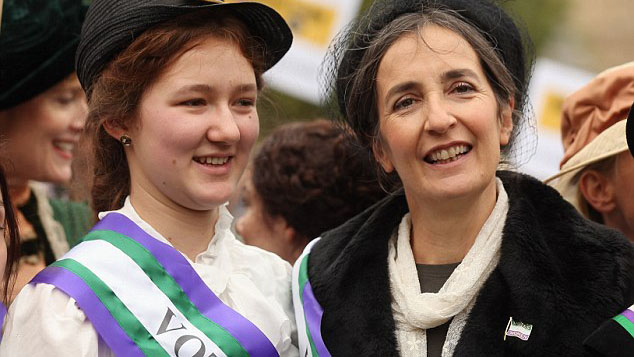
“It was incredibly moving to be involved. We often get interviewed and asked about the suffragettes, but never have we been catapulted into something that gave such an insight into what it was really like to be there,” she says.
Helen is also pleased that the central character in the film is not a Pankhurst, but a working class woman, Maud, played by Carey Mulligan.
“My grandmother became involved with women in the East End of London because she felt that working class women were the constituency that most needed the vote,” she explains.
“Maud is a generic person, and anyone can identify with her. She’s me, you, anyone just going about living her life – until she starts to open her eyes and see all the large and petty ways in which she is discriminated against.”
The film doesn’t shy away from the movement’s militancy, which Helen feels is entirely appropriate. “It’s incredibly shocking what they were prepared to do to achieve their aims. But they were just fed up with it all. The NUWSS [the National Union of Women’s Suffrage Societies, from which the suffragettes split] had done all the patient campaigning. Perhaps the success of the WSPU was because they were so bold.”
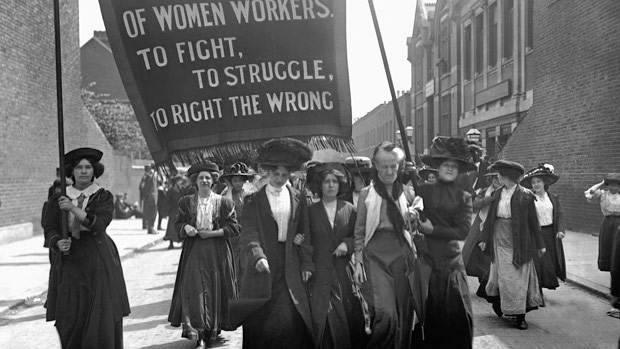
The movement was extremely skilled at organising huge numbers of women, regularly mobilising demonstrations of 40,000 around the country, and up to 250,000 on national demonstrations.
As Helen points out, “They were wacky and innovative, PR gurus well ahead of their time. They understood the importance of branding, with their green, purple and white sashes. They produced merchandising of all different kinds – badges, postcards, soap, puzzles, games.”
She is under no illusions that in the 21st century, women still have to struggle to overcome the inequalities facing them, both in the UK and globally.
“In the UK the gender pay gap affects poorer women more. Over 70% of people on the minimum wage are women. Unless you have more women in positions of power who can employ women, inequality will continue.”
The film’s director Sarah Gavron agrees that the suffragette story “resonates with what is happening around the world today, not just in terms of gender inequality, but inequality generally and the activism of people who are challenging repression.
“It’s long overdue that our great grandmothers’ stories are told. And it’s a timely and necessary reminder of how far we’ve come but also of how far we’ve still got to go.”
Like many people, Sarah grew up with a very limited understanding of the suffragette movement. “What I knew in my teens was the Mary Poppins, sanitised version of women petitioning,” she recalls. “So when I learned the true story and started researching it I was amazed.
“I was struck by how ahead of their time the suffragettes were. They were breaking all the taboos and conventions of that society. These women went to such extreme lengths to achieve their rights, and lost so much in the process, their homes, their families, their children.
“The bombing and attacks on property, the brutality of the police response, being imprisoned, hunger striking and being force fed, it felt very much like an untold story.”

The filmmakers’ research threw up a veritable treasure trove of discoveries. In the National Archive they found documents concerning the huge and technically innovative police surveillance operation on the women’s activities (pictured above). And in the archives of the Museum of London they found the suffragettes’ unpublished letters, memoirs and prison diaries.
“The suffragettes were very aware of their legacy,” she remarks. “And what’s so striking is that their voices feel so contemporary. They were talking about the gender pay gap, abuses in the workplace, custodial rights, as well as documenting their fear and exhilaration, the feeling of camaraderie in being part of a movement.”
Sarah and scriptwriter Abi Morgan decided that setting their focus on the unknown working women of the movement was the best way to connect with audiences today. “We wanted to tell the story of women with no platform, no entitlement, to see what drove them to activism.
“Working people are often at the vanguard of change, but in the shadows of history – we wanted to shine a light on these ones.”
But Emmeline Pankhurst does feature in an important cameo in Suffragette. And the moment was not wasted in the casting, with the world’s most acclaimed actress, Meryl Streep (pictured below, with Gavron), in the role. “We wanted an icon to play an iconic character,” says Sarah. “And Meryl is a great advocate for women in the film industry and beyond.”
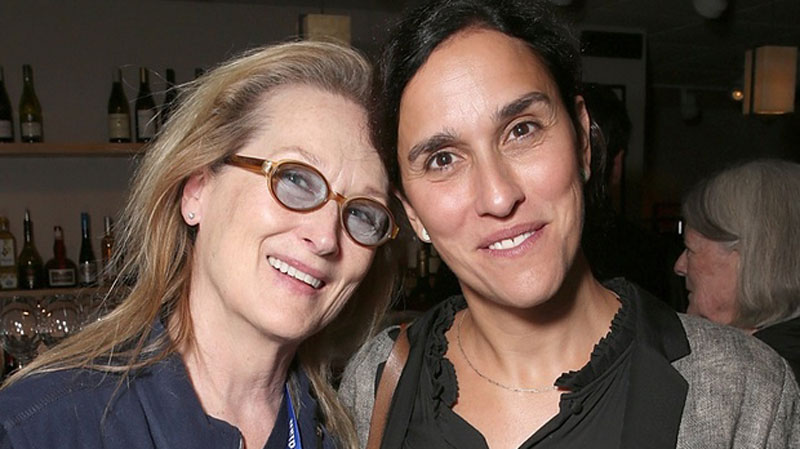
Cinema is one of the more high-profile workplaces in which women experience discrimination. “If you look at the statistics, there’s no doubt that it is an imbalanced environment,” Sarah observes. “It’s kind of shocking that more than 90% of films each year are directed by men. And there are few female protagonists in films. But I’m hopeful that it’s going to change.”
And Suffragette bucks the trend nicely, with the majority of the lead roles filled by women on both sides of the camera. It’s perhaps unprecedented for a film’s stars, director, writer, producers, production designer, costume designer and location manager all to be women.
Sarah’s own political awareness came young, when watching her mum Nicky Gavron (a Labour member of the London Assembly and former deputy mayor of London) involved in grassroots politics. “She achieved small things that were very significant in the local community,” she recalls proudly.
As a director her work, including her first film Brick Lane, has invariably had a social content. And she says that, “If Suffragette can provoke discussion and discourse and awareness, for me that would a great thing.”
Helen Pankhurst thinks it will. “It’s a feminist film to its core. Sarah, Abi Morgan and everyone involved are doing something that comes from the heart. It’s timely too – there’s something in the air right now. Feminism’s time has come.”
Clare Bayley and Demetrios Matheou
Suffragette is released in cinemas on Monday October 12



